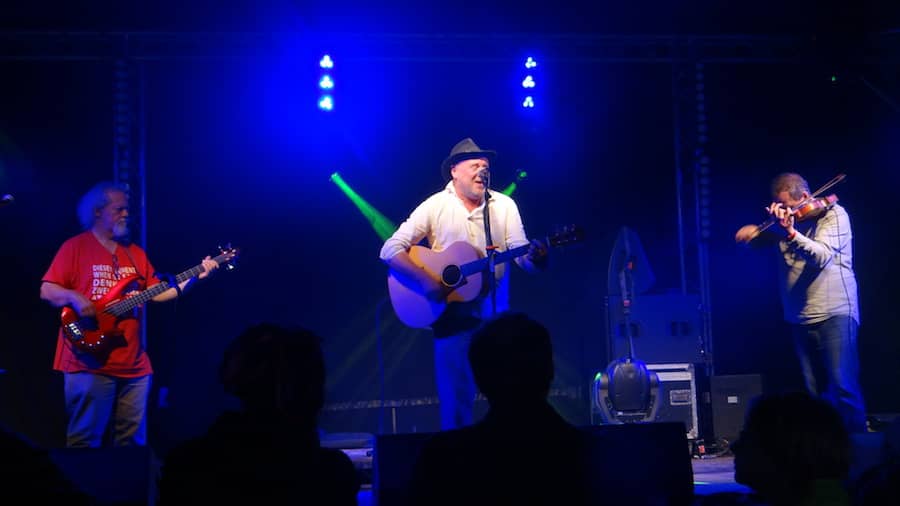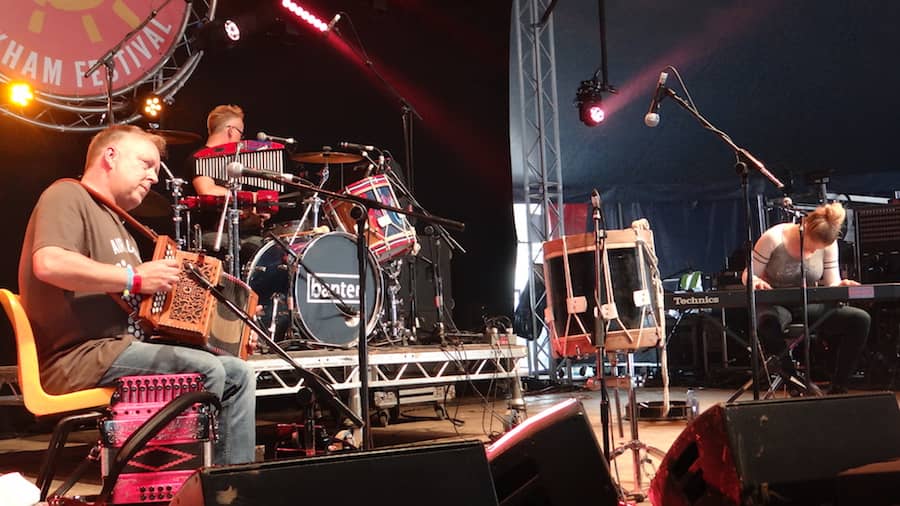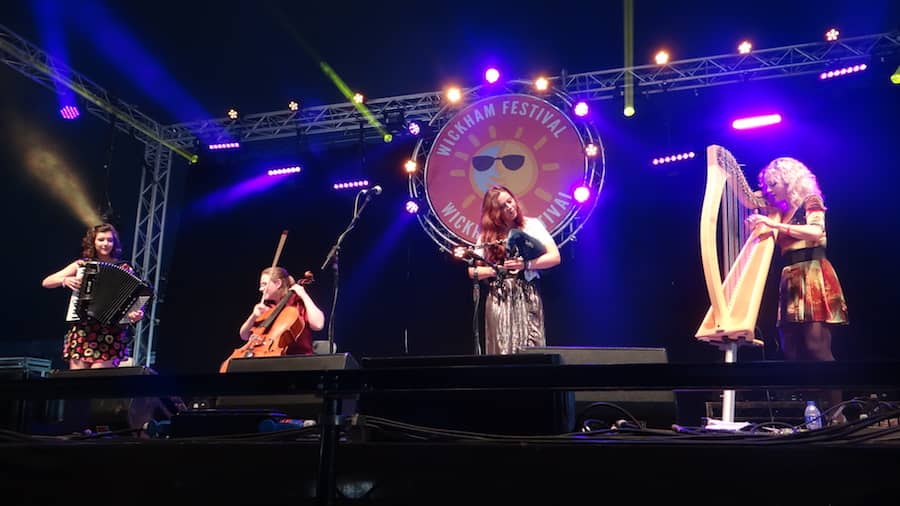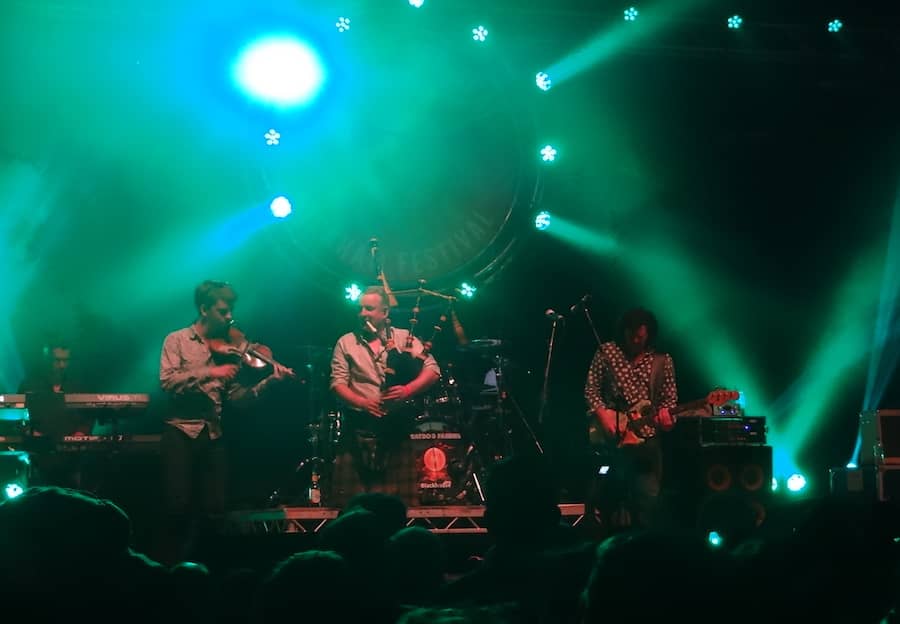The opening day of Wickham Festival typified a day that must haunt the nightmares of festival organisers. Twelve hours of torrential rain on the previous day severely disrupted final preparations of the site and, with every subsequent vehicle movement, ground conditions worsened. It was a herculean task to ready the site but, by Thursday evening, the public were able to enter a still muddy arena field, and the first session of music could go ahead. Dry weather overnight, early morning sun and the spreading of vast quantities of straw ensured that by midday Friday wellies, while still commonplace, became an optional fashion accessory. All thanks to mammoth efforts by the entire festival crew. Over the next 3 days, musical highlights were many and varied, more than enough to drive out muddy memories.
For a fortunate couple of hundred weekend ticket holders, the music had, in fact, started on a Wednesday evening. In a new venture this year, long-serving festival compere Alistair Russell and folk rockers TRADArrr played a pre-festival warm-up gig in Wickham Community Centre. The band showed yet again they are developing into a force to be reckoned with. The talents of the 7-piece line-up ideally suited to defining folk rock for the 21st Century.

Mancunia
Once the festival proper got under way, two very familiar faces appeared in new and, in some respects surprising, guises. After a period when he’s directed his many talents towards session work, production, the occasional solo album, and, what Peter Knight described as a “true labour of love”, the Dave Swarbrick Fiddle Tunes book, Maartin Allcock is back in a band. Mancunia is a trio, Maart provides electric guitar, bass guitar, mandolin, keyboards and a fair amount of laptop wizardry, France based singer songwriter Tim O’Connor adds acoustic guitar, the trio completed by fiddle maestro Andy Dinan. All three hail originally from Manchester, hence the band name, and they’ve had various connections over their long individual careers. Mancunia came about, though, in typically modern style with snippets of songs and tunes being passed between them over the Internet. Having decided it was working, snippets became tracks and tracks became an album, Turn Towards The Sun, launched, fittingly, in Manchester at the end of July. Their Wickham set showcased tracks from this album, ranging from a lively set of tunes that immediately had the audience moving, to the title track, Tim’s voice somewhat wistful, combining with echoing fiddle to give an eerie feel to the song. In performance, their music clearly depends on great mutual understanding and plenty of eye contact, becoming almost jazz-like at times. Their reception from a packed tent should have left them in no doubt that this trio does indeed work. I’m looking forward to hearing the recorded tracks and fully appreciating the extra sound layers resulting from Maart’s wizardry.

Banter
Later in the weekend, it was Simon Care’s turn to put on a fresh suit of musical clothes, appearing as part of the Banter trio. On one level Banter deals with the music Simon is most often associated with, playing dance music for ceilidhs, and this they did on Saturday evening in the Community Centre. However, their main stage appearance allowed the song writing of keyboard player Nina Zella to come to the fore and gave drummer Tim Walker ample opportunity to show his multi-instrumental skills on trumpet and trombone. Coupled with Simon’s melodeon and concertina, this array of instrumentation supplies varied arrangements for the songs and plenty of depth to add sparkle and novelty to the tune sets while Nina’s lyrics can be quite biting, often taking on political and social issues.
Wickham advertises itself simply as a Festival, but it has always ensured the folk, roots and acoustic world is strongly represented in the line-up and particularly so this year. A Festival can tell it’s getting it right for that audience when people are either singing along with choruses or up on their feet and dancing. Wickham this year provided abundant opportunities for both, maybe at the same time. When it comes to getting an audience singing, no one can do it better than Show of Hands as their closing set on Friday quickly showed. But they had plenty of competition that same night from Fisherman’s Friends and the following day from Oysterband, local favourites The Men They Couldn’t Hang and a duo appearance from Steve Tilston & Jez Lowe along with bass player Hugh Bradley, Steve’s Slip Jigs and Reels providing the perfect chorus on which to finish the set. It’s sometimes not so easy for solo performers, but Steve and Jez showed just how to do it when they performed separately later on Saturday.
When it came to keeping the audience on their feet, there was no shortage of acts willing to oblige on both the main and second stages. Thursday night, while 10cc were on the main stage, delighting the less folky crowd, Scottish trio Talisk were headlining the second stage, setting the tent alight with their powerful and eminently danceable tune sets, the fiddle of Hayley Keenan vying for prominence with Mohsen Amini’s concertina, both driven along by the rhythms set by Craig Irving’s guitar. This was Craig’s final gig with Talisk, he began playing with Manran last year following Norrie MacIver’s departure and his focus now will be with them. Meanwhile, Graeme Armstrong is the new Talisk guitarist. But what a way for Craig to conclude his time with the band, a packed tent was very reluctant to let the trio leave the stage, lengthy encores keeping the good times rolling.
Wickham hadn’t seen the last of Mohsen. Sunday afternoon saw him on stage with one of the latest bands to emerge from the Glasgow session scene. Garnering widespread praise earlier this year for their debut album, Afterlight, Ímar (feature image) is a band full of energy and ideas, in fact, a perfect fit for a festival. I’d been blown away by Afterlight on first hearing. So, I was really looking forward to hearing them live and they definitely didn’t let me down. The other four members are Tom Collister on fiddle, Ryan Murphy, uillean pipes, flute and whistles, Adam Rhodes, bouzouki and Adam Brown on bodhrán and guitar. If those names seem familiar to you, well, they should, Tom and Adam Rhodes appear with Mabon and Barrule, Ryan is with Mànran and Adam Brown with Rura. All currently based in Glasgow, they came together through a shared interest in Irish and Manx tunes, and it’s pieces in these styles, either traditional or their own compositions, that form the core of their repertoire. They say themselves “you won’t often hear anyone in Glasgow playing slides and polkas” but they do and they do it exceptionally well, a band to look out for.

Kathryn Tickell and the Side
Throughout the weekend there was never a long wait for the next set of lively, danceable music. Kathryn Tickell and the Side showed that whilst it may still be a male dominated genre, gender is no barrier to producing music that raises the excitement level and temperature of an audience. Kathryn, with her Northumbrian pipes and whistles, fronted the usual line-up of Ruth Wall on harp, Amy Thatcher on accordion and Louisa Tuck on cello, but she also had a secret weapon in store, Ian Stevenson on guitar joined them a little way into the set. Ian had been engaged to take Amy’s place, as it was on the cards she would be occupied giving birth rather than playing the accordion. In the event, the baby arrived with a couple of weeks to spare. By that time, Ian was up to speed with the music and so was invited along. Amy then showed being a new mum was no barrier to performance, both with the accordion and her trade mark clog dancing.

The Peatbog Faeries
Also on the main stage were two bands for whom raising the crowd to energetic heights of activity is a raison d’être. They both succeeded superbly. The Dhol Foundation’s drum rhythms are impossible to resist when paired with their rapid tutorials on Indian dance; they’re guaranteed to get people on their feet. Coming on stage late Saturday afternoon they found plenty of willing tutees. Closing the festival on Sunday night, The Peatbog Faeries induced even greater audience activity. With Peter Morrison’s pipes and whistles and Ross Couper’s fiddle leading the way, they produced an hour and a quarter of almost continuous music which, combined with a hyper-lively lighting routine, turned the big top into the perfect Celtic trance venue. Less well known but equally effective at generating a high energy performance, Tankus the Henge’s cocktail of rock’n’roll infused with ragtime, gypsy jazz and ska ensured that late Sunday afternoon in the big top was every bit as lively as Saturday.
Not to be outdone, the programming on Stage 2 ensured plenty of dancing and jumping there as well. Thursday closers Talisk had set a high standard that Edward II on Friday and The Goat Roper Rodeo Band on Sunday maintained. For Edward II there were almost as many people outside the tent as inside, eager to hear their inimitable fusion of tradition with reggae, a testament to the quality of the band, given Show of Hands were playing in the Big Top. The Goat Ropers faced a similar challenge being pitched against The Peatbog Faeries as Sunday closers but they also showed their class in front of an enthusiastic and crowded tent.
I’ve commented before that festivals can’t afford to be “wham, bam, thank you, mam” for hours on end and Wickham provided some excellent examples of how to treat an audience to quieter intervals. Miranda Sykes and Rex Preston have been an in-demand duo for the last few years but announced earlier this year they were calling time. At Wickham, we were treated to their final gig together and both they and the crowd rose to the occasion. The memory of Miranda’s voice soaring above Rex’s mandolin, sometimes strummed, sometimes intricately picked, will live long in the memory.
Duncan Chisholm’s return to Wickham gave us another masterclass in beautifully structured instrumental music rooted in the sense of place and mood that the Scottish Highlands generates so strongly in Duncan. Billed as Duncan Chisholm: The Gathering, the gathering consisted of Duncan, Ali Hutton, Jarlath Henderson, Hamish Napier and Su-a Lee, as fine a collection of Scottish musicians as ever made it as far south as the English Channel coast. Well, ok, technically Su-a Lee is Korean, but she does live in Edinburgh. Duncan’s previous albums formed the Strathglass trilogy, pieces inspired by three glens that, along with Strathglass itself, form the ancient lands of Clan Chisholm. After The Gathering had played their set, including some pieces from these albums, Duncan was eager to talk about his current project. Co-written with Hamish Napier it is nearing completion, Donald Shaw currently working on string arrangements. The new music is inspired by one specific place, the album title will tell us where, but for now, he’s keeping it a close secret.
When Oysterband played on Saturday night, we were treated to one of Ray Cooper’s rare returns since leaving the band in 2013 after 25 years’ service. Not surprisingly, his appearance on stage brought an enthusiastic response from Oyster’s fans, and soon familiar cello riffs were raising yet more cheers. Ray’s weekend didn’t finish there; he started off the Sunday programme on stage 2 with 45 minutes that highlighted the music he’s been making, most often back home in Sweden, since leaving Oysterband. The majority of songs were his own compositions and revealed well-crafted melodies and lyrics of some depth. Qualities that were perhaps not so easily recognised as being uniquely Ray’s while he was writing as part of the band. Some of his songs are clearly very personal, beautiful lyrics written for his daughter, one, in which his cello features strongly, celebrates the delight he takes in Arctic winters. Others, dealing with far less personal topics, reveal a remarkable depth of knowledge, sometimes of surprising subjects. For example, Amal al-Atrash, better known by her stage name Asmahan, an actress and singer with a formidable reputation throughout the Middle East during the 1930s and 40s. Ray’s songs have the ability to draw you into these times and places, leaving an urge to learn more, matching the curiosity that drove him to write them. His songs have so far appeared on two solo albums; the first released while still with Oysterband, the second after his departure. A third album is close to release, and we can expect a UK tour in support. Both will be well worth waiting for.
It’s never possible to capture in an article all the good things that happen over a 4-day event. But, after 10 Wickham Festivals, its reputation continues to grow, and you can be confident the next one will be packed with yet more great music.
https://www.wickhamfestival.co.uk/
